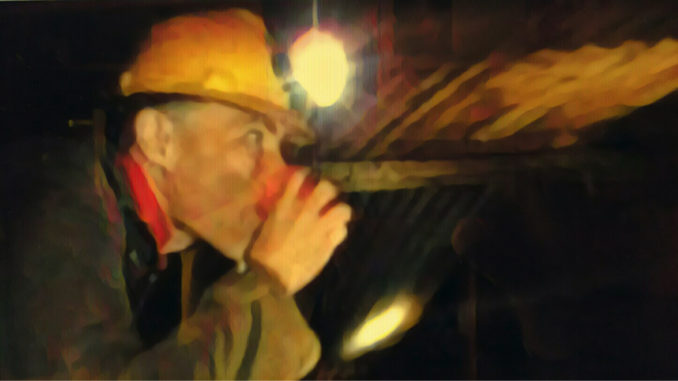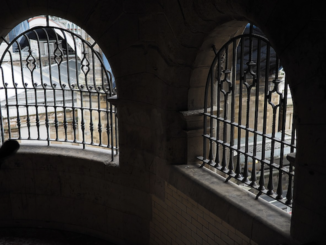
© Always Worth Saying, Going Postal 2021
Davies brought me breakfast in bed. Was it genuine concern or his army humour? I was in a bit of a state. His cooking wasn’t great. The culinary school that he relied upon seemed to rest upon the theory that ingredients didn’t become a meal until boiled in fat. Our accommodations weren’t great either. If a restaurant, they would have been described as ‘simple, with a certain provincial 1980s student bedsit wet and drafty austerity’. We were enjoying a twin room in a flat above a corner shop. There was enough space to stand between the beds, just. At the end of the beds stood a wardrobe and desk before a window that was painted shut. Holes and cracked glass decorated a view of rows of terraced rooftops which ran all the way past the factories and mines towards the power station and docks.
Decor? Bucket of watered-down whitewash thrown at the walls. Landlord? Fat guy with a face turned ruddy, not from healthy hikes through the hills behind the township, but from his smoking, boozing and heart condition. In between swigs and puffs, if anybody was within earshot, they’d have heard him say we’re DHSS scroungers working for a cash in hand gangmaster. In doing so, he was repeating the chat from down the street. Mrs woman, putting a pint of milk and packet of fags in her shopping bag, had whispered to him, “A minibus stops for them on the main road early on. Picking cockles, planting tatties, jobs our men should be doing.” Let them think that, suits our purpose.
At the other side of a partition wall was another bedroom with another two hard mattresses and wooden beds. Various gentlemen of similar employment (and the occasional smuggled-in girl) came and went. Not quite Pimlico, we were in Sleescale, way up north. So far north that a ball converted over the local XV’s tin shed stand might bounce down a cobbled street until it fell off the edge of the world.
But I understand the lingo, this being one of my many voices. My mother had family here. I could tell tales of some of the town’s characters. No, I couldn’t pretend to be born and bred but I could convincingly claim to have lived here, moved on to the bright lights of London, and then moved back the day before yesterday, or the other week, or years ago. If the curious wondered why I’d returned, the answer was because of Thatcher, also the reason I’d left, if they needed to know. In between beating up Argentinians, the IRA and bolshy unions, the Prime Minister had other uses. Which brings me to my profession. This and that, something to do with the mining industry maybe, change the subject. The first thing to do when undercover is to find out about the local schools. No matter how convincing the accent (and I can do Ulster council estates as convincingly as my distant Sleescale relatives terraced streets), they would try to catch me out in Northern Ireland by asking about my first school. Not too difficult a bluff, but the supplementary would be,
“Who was your first headmaster?”
Ouch, and a potentially deadly ouch at that. A schoolgirl worked in the shop downstairs. I admonished her for being slow with my milk, bread, eggs, beans, sausage and bacon. I would report her to her head. She enjoyed the flirt. Got a name out of her and the fact that he’d been there since forever. Being near the start of my service, and therefore only a few years older than her, Mr Moors would do.
“Keep away from the bloody schoolgirls,” had been Davies’s advice as I threw our groceries at the pantry. “Don’t forget the conversation we had on the train coming up.” He didn’t miss a thing.
That early morning, back in our half of the upstairs, Davis slapped a plate of burnt sausages and raw bacon on my lap. He placed a mug of something unspeakable on the equally unspeakable carpet, too close to the mouse scats for my liking. Not coffee, tea nor cocoa, it tasted of nothing except heat. Most welcome all the same at four-thirty on an April morning.
He shared his thought for the day, “Don’t stand still and let them thump you.”
Our task is picket line infiltration and I’m making a mess of it. Battered and bruised from the previous day’s excitement, my sore ribs made it a struggle to breathe let alone breakfast. The rough and tumble of being an agent provocateur at the local coal washery had been a bit too rough and had carried with it a few too many tumbles. A bad-tempered line of men had tried to block the delivery wagons. After starting a fight, I came out the worse for it, surprise, surprise. Damn those television news crews, why couldn’t they be filming a quiet piece of countryside on a striker’s day off? Davies on the other hand, seemed to have enjoyed it.
“Bad for morale,” my roommate continued. “The rest of us feel ill watching you. Get in nice and close so they can’t throw a punch. Rough them up, near to, as best you can. Grab ’em by the nuts if you have to. Nip like a girl, if it helps. Don’t just stand still and let them hit you,” he repeated, “You’re embarrassing us all.”
I picked myself up on my sore elbows and addressed his fry up with my fingers. Whatever elite regiment Davies was aiming for, I hoped it wasn’t the catering corps. I was grateful anyway.
“I thought uniform were supposed to know that we’re here?” I said in plaintive self-defence.
“They do,” he replied. “But they’re not going to pick you up like an old lady carrying a dog across a puddle, are they?”
I wasn’t too bothered about puddles, but I was bothered about this. I swung myself around and pulled my bottom half down to show him my bum.
“Look at that,” I instructed him.
There was a giant bruise across my backside the same size and shape as a policeman’s baton.
“I don’t want to eyeball that first thing in the morning do I?” He understandably observed.
“Listen,” he explained. “Plod hates us more than they hate the striking miners. The last thing they want is having to cope with trouble in front of the media. They’d rather sit all day in deck chairs, next to a brazier, drinking tea, talking about whippets and who’s the next to marry their cousin in this God-forsaken pit.”
While they pay off their mortgages on quadruple time, he could have added. That was the thought that had been going through my mind while big chaps in uniforms with batons, who knew exactly who I was and whose side I was on, had been battering me in front of the clicking cameras.
Davies took my empty plate off me before I’d had a chance to lick it clean, which I would have, this was a high-calorie occupation. It was spill out of bed time, literally. Being six foot three and built like an ox, Davies could pick up my bed by a leg and start my day by tipping me onto the mouse muck and damp floor. Ten minutes later, we were at the end of our road, standing under a street light, waiting for our pick-up. Above, the stars looked down, below, tarmac and cobbles peered up.
Well beneath, sprawled a warren of workings, shafts and levels. Ordinarily they, not too subtly, brought nature’s gifts to the surface. And not only coal, the iron mines were still extracting ore and ran close to the coal seams. And not only under our own feet. The mines ran for miles until they even bothered the seabed below the trawlermen bringing their catches into Port Sleescale.
The silence of the morning was disturbed by approaching worn tyres and even more worn brakes. It was our lift. We were the first collection. We sat in the front, on a three-abreast bench seat, next to our driver, the Colonel. A real colonel, sort of retired, he consisted of two spheres, a head one on top of the shoulders of a body one. Stout but short limbs were attached. All four of them fought with a battered Transit van’s pedals, gear stick and steering wheel. Giving the impression of riding the charabanc rather than driving it, sweat ran down his brow from beneath impossibly black hair and headed for his blotchy drinker’s cheeks.
The colonel had been everywhere, done everything and used the experience to exhibit an effortless sense of quiet unchallengeable leadership. He was no use on the picket lines. If he’d strode towards an angry gathering of men in NCB jackets and toe tectors they would have bowed down before him and gone back to work apologising. Instead, the Queen had put him in charge of logistics. The logistics being one battered Transit van for fifteen odds and sods scattered about Sleescale’s grim lodgings. Each day we had to be matched up with trouble to be stopped or trouble to be started. Plus the Colonel was our agony aunt. I certainly could remember what Davies had told me on the train down from London, but I needed a confidant to discuss it with. The Colonel would be ideal. The problem being, getting him on his own.
To be continued…..
© Always Worth Saying 2021
The Goodnight Vienna Audio file



